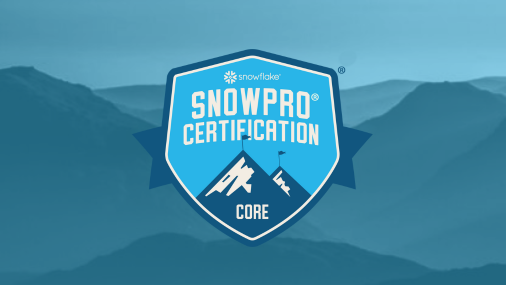
Are you contemplating adding Snowflake to your stack, or upping your Snowflake skills in general? Great. Maybe you're still deciding on which certification to take, or wondering how much time you have to set aside for this one. This blog is supposed to help you assess that, give you a rough idea what the exam is like, and maybe help you decide if you want to follow through with this credential.
What is Snowflake?
Snowflake is a cloud-based data platform designed for scalable data warehousing, analytics, and secure data sharing. It enables high concurrency and elasticity without infrastructure management, supporting diverse workloads such as SQL querying, machine learning, and real-time data applications.
Which certification types exist?
The table below shows the available certifications, with SnowPro Core being a prerequisite to the various SnowPro Advanced certifications. There is also an official learning track with several Snowflake hands-on workshops where you can dive straight into doing stuff with the platform. They're a lot of fun, though they can seem a little slow-paced somtimes. I did the first badge - the Data Warehousing Workshop - before moving on and preparing for the SnowPro Core credential.
| Certification | Focus |
|---|---|
| SnowPro Associate: Platform | Introductory platform knowledge |
| SnowPro Core | Fundamentals & architecture |
| SnowPro Advanced: Architect | Design & implementation |
| SnowPro Advanced: Administrator | Platform management |
| SnowPro Advanced: Data Engineer | Pipelines & transformation |
| SnowPro Advanced: Data Scientist | ML integration & features |
| SnowPro Advanced: Data Analyst | BI & data exploration |
| SnowPro Specialty: Snowpark | Snowpark development |
| SnowPro Specialty: Native Apps | Native app development |
| SnowPro Specialty: Gen AI | Generative AI features |
The SnowPro Core exam
The proctored exam consists of 100 questions, of which 75 need to be answered correctly within 120 minutes, plus an additional 30 minutes if you're based in a country without English as an official language. So time will most likely not be an issue. When I was done, there were still 70 minutes on the clock. These are the weightings & topics covered in the exam, according to Snowflake:

While the recommended learning materials (check the next section) cover these topics from a higher level perspective, the actual exam also asks for specific details of syntax, like which parameter to use when loading a file to handle NULL values a certain way, the syntax to access specific values in a nested VARIANT column using a path & key, type conversion syntax, or the differences of available configuration parameters when setting up a Virtual Warehouse depending on the Snowflake edition in use. So the scope is somewhere between knowing Snowflake's capabilities and limitations from a high-level perspective, per edition (Standard, Enterprise, etc.) and the full details of the docs per each of these features, and the tricky part is probably getting that balance right during the preparation without being too excessive with the time invested for preparation.
How to prepare for the certification?
I gave myself three weeks of preparation, but would recommend four in hindsight. Everything you need is available at the well maintained official learning platform, Snowflake University, as well as the official Snowflake docs. Basically there is one pdf available telling you exactly the topics you need to learn for this exam - the official SnowPro Core Study Guide. To get access you'll have to submit an email using this form. It lists further details for each of the domains shown above. Here's what it looks like for "Domain 2":

So, given this information, per domain that's covered, you can now decide to do some hands-on badges, or look at the "Level Up" courses and articles recommended in the study guide pdf to your liking. The other option is to just look up each of these topics in the documentation, read through it and start taking notes, while keeping track of time to not get lost in the docs chasing referencing links. If you want to invest the minimal amount of time for passing, I'd say this is probably the best way. Also the dullest though, most likely.
Practice exams
To get used to the style of the questions and to help memorize some recurring topics, I also bought access to 27 practice exams for $20 by a third-party supplier. Official practice exams are also available, but at a different price tag unfortunately. In total I've done 11 test exams, starting the day I began learning for the certification - and I can't really say I excelled at them. Below is the trajectory of my performance:

It helped to get a first feel for the exam questions though. So I'd probably recommend that, too. Also, you can make double use of them by collecting the things you got wrong in a text file and using an LLM to spin up mock exams based on it - so based only on the things you got wrong. It worked very well for me.
So, to sum it up, I'd recommend to
- use the official study guide to plan your time
- use the docs a lot
- get at least some hands-on experience
- be aware of the time spent on the additional resources mentioned in the study guide
- maybe look into practice exams
